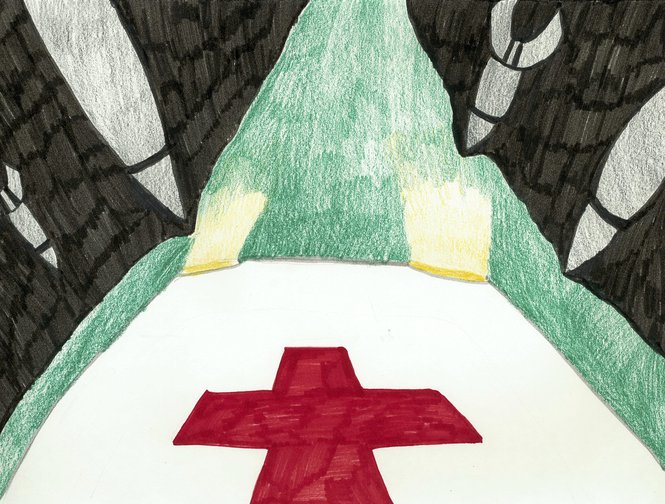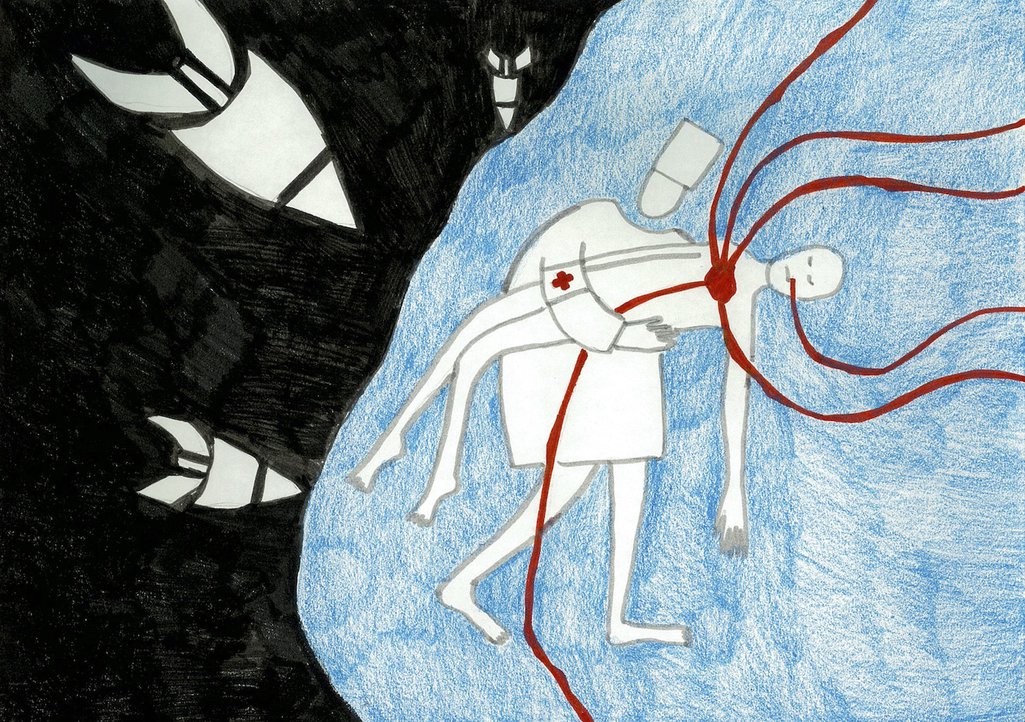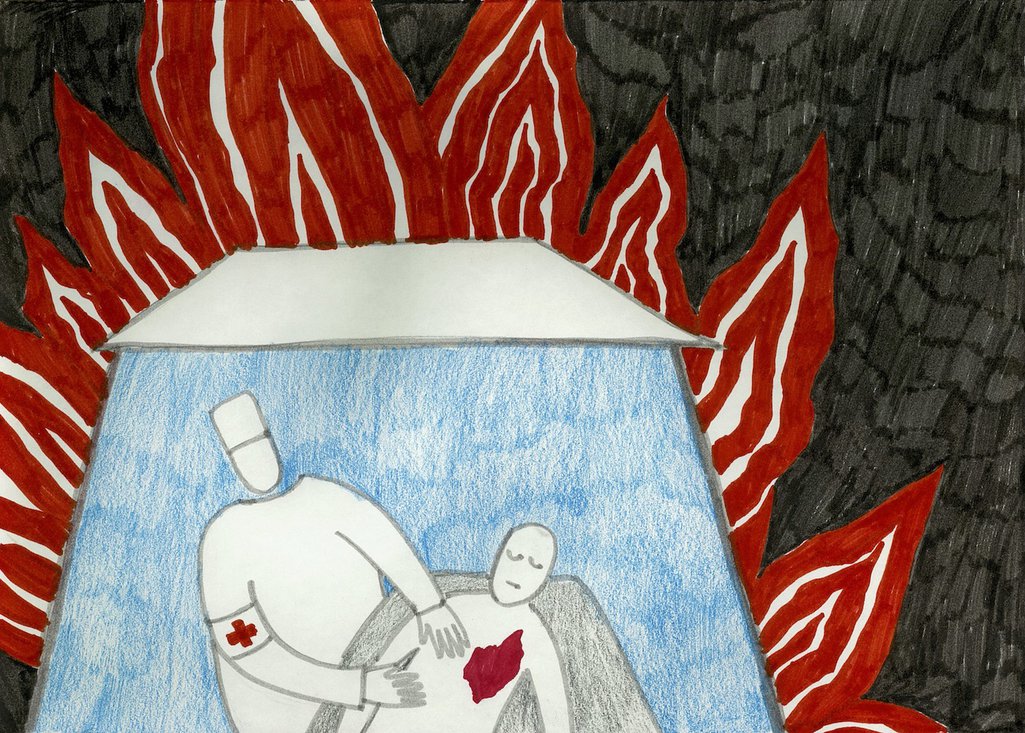‘Battlefield medicine’: Ukrainian medics caught in the crossfire
Medical staff from across the country share their experiences since the start of the Russian invasion

|Darya Tsymablyuk
Ukrainian healthcare workers have been working around the clock since Russia invaded the country on 24 February – and in unimaginable conditions. According to Ukraine’s Ministry of Health, by 16 March, Russian forces had attacked 43 ambulances and 117 hospitals. Ten of these hospitals cannot be repaired, Ukrainian officials stated.
Two weeks ago, Russian forces attacked a maternity hospital in Mariupol – the images of two pregnant women who were injured spread around the world. One of the women died, but the second gave birth to a girl, Veronika. Births in bomb shelters have become common, as have doing operations and evacuating seriously ill patients while under Russian shelling.
openDemocracy asked Ukrainian healthcare workers across the country to share how their work has changed since the start of the invasion
Yaroslav Borisenko, an emergency doctor from Sumy
Our ambulance teams have been reinforced with new people. In peacetime, we could go out with one other medical worker; now we work with at least two. At the moment we are not responding to non-emergency calls, such as an increase in temperature or blood pressure.
At one ambulance station, Russian forces stole three ambulances and destroyed an entire ambulance unit while an ambulance brigade was out escorting people through a humanitarian corridor. They broke windows, stole equipment and medicine. As a result, there’s a catastrophic situation with the provision of emergency medical care in the area. We don’t know what’s behind these actions. Perhaps it’s some kind of provocation. Perhaps the Russians will simply use the ambulances as a means of transport.
If there is shelling or air strikes, then the ambulance doesn’t go out on critical calls — for the safety of medical personnel. Many citizens may not get emergency assistance on time.
The other day we had a call-out: a gunshot wound. As we passed through enemy checkpoints (although there was a “green corridor”), the Russians said that there was no corridor and if we had been driving a little faster, they would have killed us. I told them: it’s an ambulance! They said they didn’t care. I was struck by the composure of the Russian soldiers when they said “Yes, they would have shot, even an ambulance.”
At the moment, the ambulance teams don’t have enough trauma kits to stop bleeding
They searched our vehicle, took away our cigarettes and torches. The soldiers then consulted with their command, and let us go on. We found the casualty, rendered assistance and took them to hospital. En route, artillery shelling began, which could have ended very badly for all members of our team.
At the moment, the ambulance teams don’t have enough trauma kits to stop bleeding, or IV kits or special equipment for providing assistance in wartime conditions. Field personnel are conducting simulation training.
The population of our city has dropped because people have left for safer regions, so we get fewer calls – which means the burden on the ambulance teams isn’t excessive. Before the war, we provided assistance to a population of 240,000; now, we’re dealing with far fewer people. Plus, we began to filter our calls more, so we are coping. There are supplies of medicines for several months. There’s no urgent shortage of personnel or medicines, but there is a shortage of trauma kits, bulletproof vests, helmets, chemical protection – which causes concern.
We sometimes encounter Russian soldiers at checkpoints, while escorting civilian convoys or visiting casualties. We’ve found some soldiers are neutral, but there is also a hostile attitude. For example: we came across a Russian tank standing in the middle of the road. We wanted to pass on one side, but it began to point the barrel at us; we started to drive in the other direction, but it turned the barrel there. We didn’t understand what the Russians wanted, where we were supposed to go and why they were following and pointing weapons at us. You feel this danger constantly. It has become more difficult to work.

There are difficulties in providing medical assistance. Military medics work differently from us civilians. We must work in a safe environment, and never under direct fire. But in general, I can’t say that the healthcare system has broken down; everything is working, we are ready to provide assistance to our citizens. Of course, we’d like to have more resources to control bleeding and care for injured patients, but at the moment they are enough. But if we have to face what is happening in Mariupol, these supplies will not last long.
Here’s another example of what’s happening. We had a call-out to an injured woman near Sumy. We came across a tank on the way. Then we found the woman had two gunshot wounds, amputated fingers, and a scalp wound to the head. We provided assistance and started to evacuate her when they started shelling.
They didn’t shoot at us, but on our way there we saw that the asphalt had been destroyed and there were unexploded rockets sticking out of the ground. If we had arrived ten minutes earlier, we’d have been the ones needing help.
Every time you go out, you don’t know which route to take. I didn’t think the military could create such a level of danger for civilian medics. This causes a certain dissonance. It doesn’t make sense in your head.
But no matter what, we will continue to provide medical assistance to people in need. Ukraine will definitely win this war! Glory to Ukraine!
Oksana Slobodyana, a nurse and activist with the ‘Be like Nina’ nurses movement from Lviv
The neurosurgery department at Okhmatdyt children’s hospital in Kyiv moved to Lviv, to my hospital. The resuscitation and cardiology departments too. If someone needs an organ transplant, they can’t wait. You can delay a little, but you still need to do it. In general, there are many children. Not every department is overcrowded, but many are.
There are also constant air raids in Lviv. And nurses, in addition to their main duties, are responsible for evacuating patients. This is especially difficult for children in intensive care, or in the surgical wing, where they are bedridden without their parents. You need to take this baby with all these tubes and devices, and carry them down to the bomb shelter. This is a very difficult situation. After all, it’s better to not touch these children at all. And then you have to carry them up and down two or three times a day. This is very hard psychologically, and also physically.
One mother started an argument, saying that she’d already been down to the bomb shelter three times, but there was no bombing and she’d no longer go to the shelter. But it’s the doctors who are responsible for the situation. You have to find a psychologist to be able to help and support, and sometimes scold. Every situation is different. No one pays attention to labour rights because of the war. This is logical. Well, we are sacrificing ourselves. We won’t try to defend our rights over nothing, we understand that the situation in the country is even worse. This is our Ukrainian nature.
Oleskiy Chupryna, a surgeon and head of an independent trade union from the Poltava region
In general, our situation is calm. The hospital is operating normally. None of the staff has gone anywhere. Of course, everything is ready for a mass casualty situation – bomb shelters and so on. But we are still accepting most ordinary patients.
There are certain restrictions; we try not to keep patients in hospital, we transfer them to outpatient treatment. But we are ready, we are here.
All doctors are liable for military service, we are all in the operational reserve. Some doctors have already been called up. But we have certain responsibilities, and we are fulfilling our duties in our city.
We are getting supplies according to the old, 2014 tradition: volunteers. We have not been lucky with our hospital’s administration, it lives its own life. As for volunteering, I don’t know how it works in other cities, but here we see, sometimes, a not entirely rational use of volunteer groups. They work on their own and there is no logical connection with their work and ours. If they bring us something we don’t need, I try to transfer it to other hospitals. I do a normal day at work. Then after work I coordinate between volunteer groups. I’m trying to sort out the logistics.
It’s quiet, which is both relaxing and slightly straining. We are on standby. It is exhausting. But this is completely different from our colleagues in Kharkiv, Chernihiv, Sumy, Mariupol. I have a friend in Kharkiv, but he is now in such a state that all I can do is call him once a day, hear his voice and that’s it. There’s a lot of shelling there.
Viktoria Lisovska, a nurse from the Kyiv region
We receive wounded and evacuated patients. Both from the towns and the surrounding villages, where there has been shelling. And there are kids. Children with gunshot wounds. Civilian vehicles were shot at on the Zhytomyr highway leading out of Kyiv. Not everyone made it, unfortunately.
Next door to us are the towns of Vasylkiv, Hostomel – there’s firing there all the time. But we understand what it means to evacuate a patient with serious injuries. The most we can do is take them out into the corridor so they don’t get shrapnel wounds [if the building is shelled]. And then the staff are withdrawn (to bomb shelters), because if there are no staff, then there will be no hospital.
We have generators, the hospital can fend for itself. The only problem now is the delivery of oxygen. There are still patients with COVID; the pandemic hasn’t gone anywhere. So we try to conserve oxygen as much as possible.
They brought people without limbs, we had to do traumatic amputations. You don’t see that every day either
The hospital purchases medicines centrally. Plus, volunteers help us a lot. There is a whole line of people who want to help the hospital. Civil society supports us 100%.
Battlefield medicine is different from conventional medicine. For me, it was a shock when they brought in a child with a gunshot wound. A child who had been deliberately shot. It was a shock. They brought people without limbs, we had to do traumatic amputations. You don’t see that every day either.
We all stay at our posts. Staff who have children were given time to evacuate them, and then the mothers came back. But to leave for somewhere else? Such a thought never crossed my mind. Let people know that we will hold out!

Vitaliy Krylyuk, a doctor at the centre for emergency medical care and disaster medicine in Kyiv
The last time something like this happened in our country was during the Second World War. But since 2016, our ambulance teams have been trained according to new standards. Including tactical medicine. I think they turned out to be the most prepared for work in war conditions.
Kyiv’s Right Bank takes more wounded from the suburbs of Kyiv. But people are also brought to us here on the Left Bank. Medics are ready to provide medical assistance both in the hospital and, if necessary, in bomb shelters.
What struck me the most was that the day before the war started, we were in the city of Kremenets, in Ternopil region, for an annual conference and training for emergency medical care specialists from all over Ukraine. People had the chance to stay in this safe place in the west of the country. But everyone returned to their homes – to Sumy, Kharkiv, Mykolaiv.
When my friends and I were returning to Kyiv, and we saw this giant convoy of cars on the way out of the city, this was, of course, amazing. My relatives live 15 kilometres from the Romanian border in Bukovyna, but I did not consider going there. We are staying and doing our duty.

